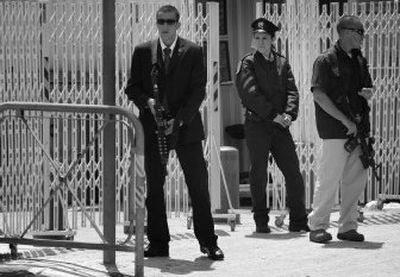Sides discuss elements of Palestinian statehood

JERUSALEM – The Israeli and Palestinian leaders on Sunday discussed the outlines of Palestinian statehood for the first time in six years, taking a modest step toward breaking the long paralysis in peacemaking.
In the first in a series of biweekly talks, Israeli Prime Minister Ehud Olmert and Palestinian President Mahmoud Abbas focused mostly on day-to-day issues such as travel and trade restrictions, but also raised broader issues that have not been discussed by the two top officials since the collapse of peace talks in 2001.
Representatives of the two sides said Olmert and Abbas discussed the structure of the government of a future Palestinian state and economic cooperation, among other topics.
“It was a good beginning,” Palestinian negotiator Saeb Erekat said of the meeting, which lasted more than two hours. Olmert and Abbas smiled and looked comfortable as they walked into Olmert’s official residence in central Jerusalem.
Israeli government spokeswoman Miri Eisin called the talks “very positive,” adding the two leaders broke away from their aides and spoke one-on-one for more than an hour.
Olmert and Abbas plan to next talk in the West Bank town of Jericho, the first meeting of the two leaders in a Palestinian town.
Israeli officials emphasized that the two sides did not go into the key elements of a final peace deal, such as borders of a Palestinian state, the future of Jerusalem or the fate of Palestinian refugees.
“We’re not going to be talking about the core issues of the final status at this stage, certainly not with the issue of terrorism not being addressed adequately yet,” Eisin said.
Abbas has been eager to restart peace talks. Israel says it won’t address these issues as long as the Palestinian unity government, consisting of the Islamic militant Hamas and Abbas’ Fatah, fails to meet the international conditions for acceptance, including recognition of Israel’s right to exist.
Olmert also has said detailed peace talks cannot take place as long as Palestinian militants continue firing rockets from Gaza and hold Cpl. Gilad Shalit, an Israeli soldier captured by Hamas-linked militants last June.
Still, U.S. Secretary of State Condoleezza Rice has urged the sides to move beyond the day-to-day issues and begin discussions on the “political horizon,” referring to their ideas about a final peace settlement creating a Palestinian state alongside Israel.
Eisin said Israel raised concerns about weapons smuggling across the border into Gaza and the almost daily rocket attacks.
Erekat said Abbas urged the Israelis to do more to open border crossings, which are frequently closed because of Israeli security alerts. The Palestinians say the closures, which prevent people and goods from coming in and out of Gaza, have crippled their economy.